For over 60 years, British Southern Cameroons (now called the Northwest and Southwest Regions) has endured a systemic, deliberate, and well-executed marginalization under the rule of French Cameroon. What was supposed to be a union of two equal states in 1961 quickly turned into an annexation, where the Anglophone population became nothing more than a conquered people under a Francophone-dominated regime.
Many Southern Cameroonians today look at the pictures of John Ngu Foncha and Solomon Tandeng Muna and ask: Did they betray us? The truth is, perhaps even they didn’t fully understand the trap they were walking into. They believed in a federation, in equality, in a partnership that never came to be. Instead, Cameroon became a state where one language, one legal system, and one political ideology took full control.
A Nation Built on Broken Promises
From the moment Southern Cameroons voted to join La République du Cameroun, the betrayal began:
1961: Cameroon’s first President, Ahmadou Ahidjo, scrapped the federal system just 10 years later in 1972, breaking the agreement that guaranteed Anglophones a separate governance structure.
1990s: The rise of multiparty politics gave Anglophones a chance to push back, but every movement for change was met with repression.
2016-Present: When Anglophone lawyers and teachers protested against the erosion of their common law system and educational framework, they were beaten, arrested, and some killed.
Instead of addressing their demands, the government declared war on its own citizens.
The Current Crisis: A Dangerous Gamble
Let’s make one thing clear, kidnappings and killings are not the answer. The random acts of violence, ransom-taking, and civilian casualties only make things worse. But let’s also acknowledge a fact that the government refuses to admit:
There is a legitimate problem, and brutal military force will not erase it.
The Anglophone crisis is not dying down; it is evolving.
If things continue as they are, Cameroon will face an even bigger conflict in the future, one far more organized, strategic, and impossible to contain.
The government may feel that social media bans, military raids, and mass arrests are keeping the situation under control. But in reality, they are only delaying the inevitable.
What Comes Next?
History has shown us that when oppression is ignored for too long, it does not fade, it explodes.
-South Sudan fought for over 20 years before finally securing independence from Sudan in 2011.
- Kosovo endured decades of oppression under Serbia, but in 2008, it became a sovereign nation.
- Eritrea waged a 30-year war against Ethiopia, proving that a people determined to be free will never give up.
Now, let’s ask the hard question:
Does Cameroon believe it is immune to history?
Because if French Cameroon continues with its current strategy of suppression, the next wave of resistance will not be from random armed groups, it will be from a new generation of educated, strategic, and highly organized people who have learned from history.
The current crisis is bad, but the bigger storm is yet to come. The world has already seen what happens when people have nothing left to lose, they fight until they win.
Cameroon, the choice is yours. Adapt or collapse.
By Tse Tse

